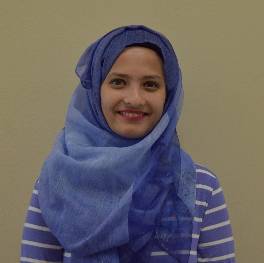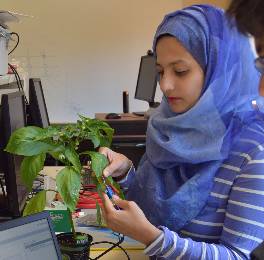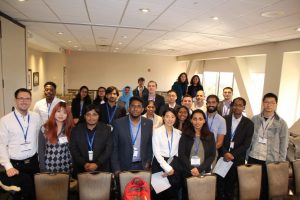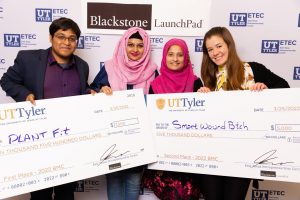Dr. Shawana Tabassum, a professor of Electrical Engineering at the University of Texas at Tyler, got the opportunity to advance her research, career, and more through the I-Corps program. Her innovative research into sensors has the potential to develop technological solutions for sustainable agriculture and precision farming and reduce environmental pollution. Now, I-Corps has allowed her not only to explore commercializing her research, but also to expand the innovation ecosystem in her region, champion women in STEM, commercialization, and more.
I-Corps at Iowa State University

Dr. Shawana Tabassum
Dr. Tabassum received her Ph.D. from Iowa State University in 2018. While there, she and her advisor researched gas sensors. These sensors could monitor gas levels in a particular environment. Initially, all of Dr. Tabassum’s tests and research were done in the lab. That changed once she participated in her first I-Corps program at Iowa State, a part of the Great Lakes I-Corps Hub.
I would recommend doing I-Corps because it can change the entire perspective of the research or technology that is being developed. As scientists or researchers, we want to help the community with research. So, unless we interact with the community we won’t know what their pain points are. Our technology might not meet their needs. – Dr. Tabassum
After the I-Corps course, Dr. Tabassum changed her mindset regarding the potential of her research and how end users could benefit from her innovations. She later took another I-Corps course at Iowa State as a Post-Doc.
Deploying Agricultural Sensors in Texas

Tabassum works on an Agriculture Sensor
In 2020, Dr. Tabassum joined the University of Texas at Tyler as a professor of Electrical Engineering. She has continued working on sensor technology, but her research has pivoted to agricultural use. Her new research focuses on plant and soil sensors that monitor crop growth under different environmental conditions. This can allow farmers to make better decisions with fertilizers and can enable more sustainable farming practices. She had the opportunity to interview key industry players and farmers during the SouthWest I-Corps program in Texas:
When I talk to growers and farmers, I realized that there is a lack of cost-effective full deployment sensors in agricultural fields. If we can get these sensors into the field, then farmers will be able to optimize their resources. For example, they may be applying fertilizers, but they don’t know how much they should apply.
If sensors are deployed in the fields, they can continuously measure the soil nutrient content, crop uptake and stress levels, and gas emissions. This would enable farmers to know exactly how much fertilizer they should apply to increase the yield and at the same time reduce environmental pollution.
Advancing Innovation and Entrepreneurship
Through I-Corps, Tabassum gained valuable interdisciplinary expertise with business and sensors. With this experience, she has been able to inspire students and further the entrepreneurship ecosystem in Texas and around the world.
In 2022, Tabassum helped to start and organize a pitch competition called Big Idea Pitch at IEEE Sensors Conference, held in Dallas, Texas. This competition allowed students to pitch and share business ideas based on their research. Students received feedback from judges, and each winner received $800 to use towards their business venture.

Big Idea Pitch 2022 Participants
The idea of these competitions is to help the students get a vision about the application of the research they create. They’re developing all these technologies, but what problems are going to be solved for the community… they will see the commercial aspect or viability of their research that they have been doing.
The 3rd annual Big Idea Pitch will be held later in 2023. Other entrepreneurship events have been inspired by Tabassum’s program, including a similar pitch competition at the 2023 IEEE APSCON conference held in India.
Inspiring Women Engineers and Entrepreneurs
As a Woman in STEM, Dr. Tabassum works with her female students to grow and succeed in a competitive field.
As a female research scientist, I would like to see more women as leaders in technology commercialization. If you look at most startups, they have sprouted from academia… Most startups are led by men. So, I would like to see more women in the field.
Most of the time we (women in STEM and commercialization) are afraid to take risks… I encourage my female students to take risks and pursue their interests. Yes, maybe in the short term you will fail, but we have a lot of things to learn from these failures. And in the long run, if we are hardworking, and dedicated enough, then I believe that at a certain time, we will see success.
Dr. Tabassum’s students have won prizes in pitch competitions and continue their lab’s groundbreaking sensor research.

Tabassum and her graduate and undergraduate students in 2022
Impact of I-Corps
The I-Corps that I participated in at Iowa State helped me in different ways; such as getting my current position at the University of Texas at Tyler, bringing my research to the market, and involving the community in the commercialization process… All these things branched out from I-Corps.
I-Corps can be a gateway to new opportunities. On the surface level, it teaches researchers how to take the next step in creating impact from their research. But it can also enable professional and personal growth. For Dr. Tabassum, I-Corps helped her gain interdisciplinary skills that enabled her to further her research at a new University, inspire students to pursue their business ideas and champion women in STEM fields.
Want to learn more about I-Corps? Check out our website:
Quotes Edited for Clarity
NSF I-Corps Hub: Great Lakes Region, 2023
Written by Chris Eakin
